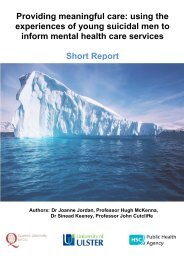Saving Mothers' Lives: - Public Health Agency for Northern Ireland
Saving Mothers' Lives: - Public Health Agency for Northern Ireland
Saving Mothers' Lives: - Public Health Agency for Northern Ireland
You also want an ePaper? Increase the reach of your titles
YUMPU automatically turns print PDFs into web optimized ePapers that Google loves.
Foreword<br />
Having a baby is a joyous and fulfi lling experience and, nowadays, a safe one <strong>for</strong> the great majority of women<br />
in the United Kingdom. This safety has been hard won. It is the result of many years of painstaking work to<br />
identify and reduce risks, and to defi ne the best treatment when complications do occur. Nevertheless some<br />
mothers still die, and these deaths are all the more shocking because they are now so uncommon.<br />
It is our duty to learn all we can from such tragedies. Confi dential enquiries into maternal deaths began in<br />
England and Wales more than fi fty years ago and have covered the United Kingdom since 1985. The triennial<br />
reports have become essential reading <strong>for</strong> health professionals, and a model <strong>for</strong> similar enquiries in many other<br />
countries. The Enquiry, however, is continually evolving and the present report has a new title, <strong>Saving</strong> Mothers’<br />
<strong>Lives</strong>. The previous name, Why Mothers Die, failed to emphasise that these reports not only describe the<br />
reasons <strong>for</strong> maternal mortality but also make important recommendations to reduce the risk of death in the future.<br />
We are concerned that the UK maternal mortality rate has not fallen in recent years. This is partly due<br />
to the changing nature of our mothers’ overall health. In general, the women who died appeared to be in<br />
poorer general health and smoked more, and over half were overweight or obese. Many also had chaotic<br />
lifestyles and found it hard to engage with maternity services. The rate is almost certainly infl uenced by the<br />
increasing number of deaths amongst migrant women, whose numbers have also risen.<br />
For this triennium the Report not only identifi es areas of substandard care but also, even though the overall<br />
percentage of such cases has not increased, includes <strong>for</strong> the fi rst time a list of ten overall recommendations<br />
highlighting the key issues to be addressed as a matter of priority by commissioners, providers and<br />
policymakers. We expect these, and the other recommendations in the Report, to lead to action.<br />
Other innovations include contributions from a general practitioner and a consultant in emergency<br />
medicine. These new chapters emphasise the need <strong>for</strong> wider awareness of risk factors and early signs<br />
and symptoms of problems which may be crucial in pregnancy. The broad range of specialties represented<br />
in the writing panel refl ects the teamwork required in modern maternity care. The team also includes the<br />
woman herself. Women who are socially excluded, such as asylum seekers or homeless people, have a<br />
disturbingly high risk of death.<br />
<strong>Public</strong>ation of this report has been achieved on schedule despite pressures from health service<br />
reorganisation. This is due to the hard work and enthusiasm of many people but we are particularly grateful<br />
to Dr Gwyneth Lewis, the National Clinical Lead <strong>for</strong> Maternal <strong>Health</strong> and Maternity Services in England. As<br />
well as directing the UK Enquiry and making insightful innovations she has personally collated the data and<br />
prepared the report. We thank her <strong>for</strong> her continuing commitment and dedication.<br />
<strong>Saving</strong> Mothers’ <strong>Lives</strong> has important messages <strong>for</strong> everyone involved in maternity care. It is essential that<br />
we do not become complacent. Although some maternal deaths are unavoidable, other women are still<br />
dying needlessly in the UK. This can be prevented in future only if lessons are learned and acted upon,<br />
and the process begins here.<br />
Sir Liam Donaldson<br />
Chief Medical Offi cer – England<br />
Dr Michael McBride<br />
Chief Medical Offi cer – <strong>Northern</strong> <strong>Ireland</strong><br />
Dr Tony Jewell<br />
Chief Medical Offi cer – Wales<br />
Harry Burns<br />
Chief Medical Offi cer – Scotland<br />
vii



